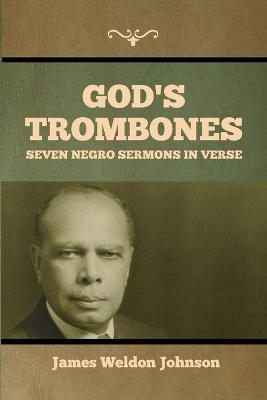God's Trombones: Seven Negro Sermons in Verse

God's Trombones: Seven Negro Sermons in Verse
God's Trombones: Seven Negro Sermons in Verse is a 1927 book of poems by James Weldon Johnson patterned after traditional African-American religious oratory. African-American scholars Henry Louis Gates and Cornel West have identified the collection as one of Johnson's two most notable works, the other being Autobiography of an Ex-Colored Man.
Johnson observed an absence of attention in folklore studies to what he called a "folk sermon," then went on to describe its nature and specific examples from his memory:
I remember hearing in my boyhood sermons that were current, sermons that passed with only slight modifications from preacher to preacher and from locality to locality. Such sermons were: "The Valley of Dry Bones," which was based on the vision of the prophet in the 37th chapter of Ezekiel; the "Train Sermon," in which both God and the devil were pictured as running trains, one loaded with saints, that pulled up in heaven, and the other with sinners, that dumped its load in hell; the "Heavenly March," which gave in detail the journey of the faithful from earth, on up through the pearly gates to the great white throne. Then there was a stereotyped sermon which had no definite subject, and which was quite generally preached; it began with the Creation, went on to the fall of man, rambled through the trials and tribulations of the Hebrew Children, came down to the redemption by Christ, and ended with the Judgment Day and a warning and an exhortation to sinners.
Johnson explains the title's use of the trombone by discussing the vocal and rhetorical qualities of a preacher he had recently heard who, he felt, exemplified the compelling and persuasive nature of the folk preacher, naming the trombone as "the instrument possessing above all others the power to express the wide and varied range of emotions encompassed by the human voice - and with greater amplitude." He also cited a dictionary definition that noted the trombone as being the brass instrument most resembling the range and sound of the human voice.
The seven poems were composed primarily in 1926, with "Go Down[, ] Death" being composed in the space of a single afternoon on Thanksgiving Day, 1926, and the remaining five poems during a two-week retreat; "The Creation," the first poem of the set, had been composed about 1919.
The work went on to find acclaim in many circles, proving "enormously popular among both the black cognoscenti as well of the masses of black Americans" and
PRP: 107.05 Lei
Acesta este Pretul Recomandat de Producator. Pretul de vanzare al produsului este afisat mai jos.
85.64Lei
85.64Lei
107.05 LeiIndisponibil
Descrierea produsului
God's Trombones: Seven Negro Sermons in Verse is a 1927 book of poems by James Weldon Johnson patterned after traditional African-American religious oratory. African-American scholars Henry Louis Gates and Cornel West have identified the collection as one of Johnson's two most notable works, the other being Autobiography of an Ex-Colored Man.
Johnson observed an absence of attention in folklore studies to what he called a "folk sermon," then went on to describe its nature and specific examples from his memory:
I remember hearing in my boyhood sermons that were current, sermons that passed with only slight modifications from preacher to preacher and from locality to locality. Such sermons were: "The Valley of Dry Bones," which was based on the vision of the prophet in the 37th chapter of Ezekiel; the "Train Sermon," in which both God and the devil were pictured as running trains, one loaded with saints, that pulled up in heaven, and the other with sinners, that dumped its load in hell; the "Heavenly March," which gave in detail the journey of the faithful from earth, on up through the pearly gates to the great white throne. Then there was a stereotyped sermon which had no definite subject, and which was quite generally preached; it began with the Creation, went on to the fall of man, rambled through the trials and tribulations of the Hebrew Children, came down to the redemption by Christ, and ended with the Judgment Day and a warning and an exhortation to sinners.
Johnson explains the title's use of the trombone by discussing the vocal and rhetorical qualities of a preacher he had recently heard who, he felt, exemplified the compelling and persuasive nature of the folk preacher, naming the trombone as "the instrument possessing above all others the power to express the wide and varied range of emotions encompassed by the human voice - and with greater amplitude." He also cited a dictionary definition that noted the trombone as being the brass instrument most resembling the range and sound of the human voice.
The seven poems were composed primarily in 1926, with "Go Down[, ] Death" being composed in the space of a single afternoon on Thanksgiving Day, 1926, and the remaining five poems during a two-week retreat; "The Creation," the first poem of the set, had been composed about 1919.
The work went on to find acclaim in many circles, proving "enormously popular among both the black cognoscenti as well of the masses of black Americans" and
Detaliile produsului








